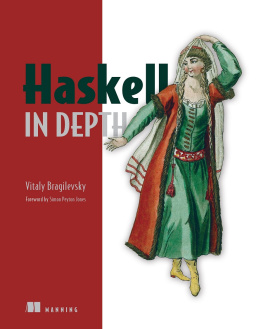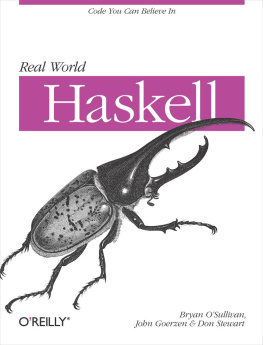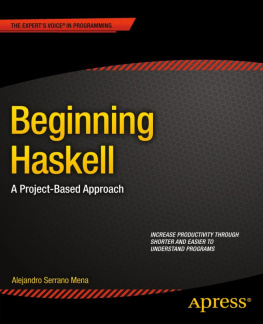Haskell is most likely quite different from any language youve ever used before. Compared to the usual set of concepts in a programmers mental toolbox, functional programming offers us a profoundly different way to think about software.
In Haskell, we deemphasize code that modifies data. Instead, we focus on functions that take immutable values as input and produce new values as output. Given the same inputs, these functions always return the same results. This is a core idea behind functional programming.
Along with not modifying data, our Haskell functions usually dont talk to the external world; we call these functions pure . We make a strong distinction between pure code and the parts of our programs that read or write files, communicate over network connections, or make robot arms move. This makes it easier to organize, reason about, and test our programs.
Even the way in which we evaluate expressions is different in Haskell. We defer every computation until its result is actually neededHaskell is a lazy language. Laziness is not merely a matter of moving work around, it profoundly affects how we write programs .
Power
Throughout this book, we will show you how Haskells alternatives to the features of traditional languages are powerful and flexible and lead to reliable code. Haskell is positively crammed full of cutting-edge ideas about how to create great software.
Since pure code has no dealings with the outside world, and the data it works with is never modified, the kind of nasty surprise in which one piece of code invisibly corrupts data used by another is very rare. Whatever context we use a pure function in, the function will behave consistently.
Pure code is easier to test than code that deals with the outside world. When a function responds only to its visible inputs, we can easily state properties of its behavior that should always be true. We can automatically test that those properties hold for a huge body of random inputs, and when our tests pass, we move on. We still use traditional techniques to test code that must interact with files, networks, or exotic hardware. Since there is much less of this impure code than we would find in a traditional language, we gain much more assurance that our software is solid.
Lazy evaluation has some spooky effects. Lets say we want to find the k least-valued elements of an unsorted list. In a traditional language, the obvious approach would be to sort the list and take the first k elements, but this is expensive. For efficiency, we would instead write a special function that takes these values in one pass, and that would have to perform some moderately complex bookkeeping. In Haskell, the sort-then-take approach actually performs well: laziness ensures that the list will only be sorted enough to find the k minimal elements.
Better yet, our Haskell code that operates so efficiently is tiny and uses standard library functions:
-- file: ch00/KMinima.hs-- lines beginning with "--" are comments.minima k xs = take k (sort xs)
It can take a while to develop an intuitive feel for when lazy evaluation is important, but when we exploit it, the resulting code is often clean, brief, and efficient.
As the preceding example shows, an important aspect of Haskells power lies in the compactness of the code we write. Compared to working in popular traditional languages, when we develop in Haskell we often write much less code, in substantially less time and with fewer bugs.
Enjoyment
We believe that it is easy to pick up the basics of Haskell programming and that you will be able to successfully write small programs within a matter of hours or days.
Since effective programming in Haskell differs greatly from other languages, you should expect that mastering both the language itself and functional programming techniques will require plenty of thought and practice.
Harking back to our own days of getting started with Haskell, the good news is that the fun begins early: its simply an entertaining challenge to dig into a new language in which so many commonplace ideas are different or missingand to figure out how to write simple programs.
For us, the initial pleasure lasted as our experience grew and our understanding deepened. In other languages, its difficult to see any connection between science and the nuts-and-bolts of programming. In Haskell, we have imported some ideas from abstract mathematics and put them to work. Even better, we find that not only are these ideas easy to pick up, but they also have a practical payoff in helping us to write more compact, reusable code.






![Will Kurt [Will Kurt] - Get Programming with Haskell](/uploads/posts/book/116897/thumbs/will-kurt-will-kurt-get-programming-with-haskell.jpg)



